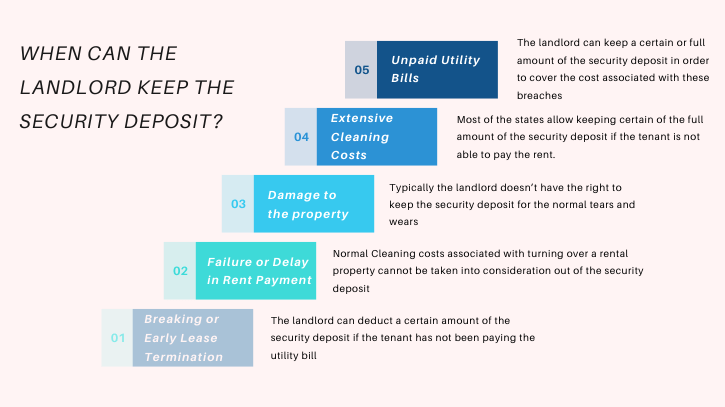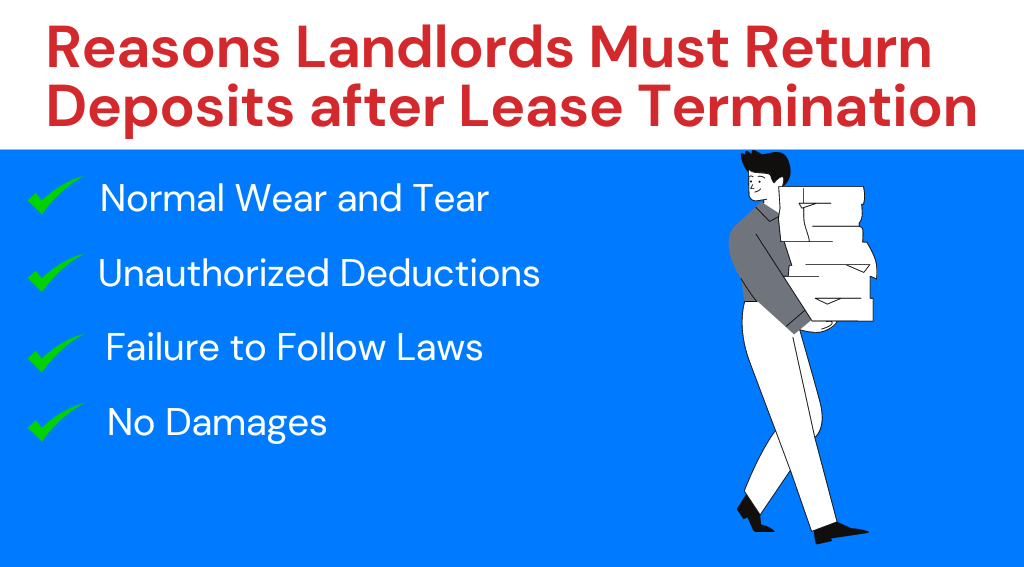When a lease is broken early, both landlords and tenants often find themselves navigating confusing legal ground. For landlords, a tenant’s unexpected departure can mean unpaid rent, property damage, and vacancy costs. For tenants, it raises a crucial question: “Can my landlord legally keep my security deposit?”
Security deposits are meant to protect landlords, but only within legal boundaries. Tenants, on the other hand, want assurance that their deposits won’t be withheld unfairly. According to a 2024 report by the National Apartment Association, 27% of property managers cited security deposit disputes as a leading challenge, particularly when tenants break their lease.
Whether you’re a landlord managing multiple units or a tenant facing an early move-out, understanding your rights is key. Lease agreements and local landlord-tenant laws determine what’s fair to deduct from a deposit and what could be considered a violation. The line between “damage” and “wear and tear”, or “justified deduction” and “unlawful withholding,” isn’t always clear.
With over 15 years of experience in property management, I’ll walk you through common scenarios, legal responsibilities, and strategies that help both landlords and tenants handle early lease terminations smoothly and fairly. If you’re looking for clarity, this article will help you protect your finances and stay legally compliant, no matter which side of the lease you’re on.
Maximize Your Rental Income with Hassle-Free Property Management
Request a Service →Key Takeaways
- The landlord can usually keep the security deposit when the tenant breaks the contract or terminates the lease early.
- The Landlord can also keep the security deposit in case of property damage due to the tenant’s actions (damages beyond normal wear and tear).
- The rules and guidelines of deposit lease agreements usually depend on the state and the circumstances of the unit or the property when the tenant breaks the lease.
What is Security Deposit?
A security deposit is the sum of the money that the new residents give to their landlord or the property management company in addition to their advance rent payments. The amount is usually based on monthly rent and it’s intended to protect the property owner in the event of damage or the breach of the lease by the tenant.
It is also known as the “damage deposit” as it may help to recover from certain damages caused by the tenants. Many landlords may require one and a half months as a rental security deposit, but this can differ from state to state. Here we discuss can a landlord keep the security deposit for breaking a lease.
Note: Get to know How to Rent your House Fast? Step-to-step Guide For Landlords in Oklahoma.
Why Tenants Break Leases Early?
There are many legitimate reasons why tenants need to break leases early and move out before the end of the contractual term. Some examples include:
- Job loss or relocation for work
- Major family emergencies or changes in health
- Unfit living conditions like pest infestations or safety issues
- Active military service redeployment
- School transfers
- Unforeseen major expenses
- Buying a home
- Landlord harassment
Landlord’s Rights and Obligations
A lease is a binding legal contract between landlord and tenant. The landlord has the right to enforce the full term and collect the rent due. But they also have legal obligations.
Landlords cannot arbitrarily withhold deposits when leases are broken. Local landlord-tenant laws protect tenants against illegal deposit retention. Landlords must follow proper procedures for inspecting premises, assessing damages, sending notices, and returning balances owed.
State Laws and Security Deposit Disputes
Laws governing security deposits vary widely across states. Each state outlines specific procedures and restrictions on legal bases for retaining deposits after lease terminations.
States like California have strong tenant-friendly deposit laws. Landlords can only deduct proven damages beyond normal wear and tear. Strict documentation is required. But in states like Alabama, landlords have greater discretion to retain deposits for lease violations.
To dispute improper deposit deductions, tenants must reference specific state or local statutes that apply to their situation. Consulting a tenant advocate or real estate attorney helps navigate applicable laws.”
When Can a Landlord Keep a Security Deposit?
First, let’s clarify the question of the article “Can a landlord keep a security deposit for breaking a lease?”. The final answer is here:
Of course, landlords can keep a tenant’s security deposit if they violate the lease, as long as this consequence is clearly stated in the lease agreement.
The conditions under which the landlord is allowed to keep either a portion or the entire amount of the security deposit vary from state to state. Each state has its own security deposit laws that must be followed by both the landlord and the tenant, including the conditions under which the landlord can retain the security deposit for breaking the lease. The state-specific laws may increase as well as decrease.
Here are the 5 most common conditions that a landlord can keep security deposits:
- Breaking Lease or Early Lease Termination
- Failure or Delay in Rent Payment
- Damage to the Property
- Extensive Cleaning Costs
- Unpaid Utility Bills

1. Breaking Lease or Early Lease Termination
The landlord can hold a certain or full amount of the deposit in order to cover the cost associated with these breaches if the tenant breaks the lease. Whether the tenant has signed a lease or rental agreement for a month or a year, it’s expected that the tenant will stay for the expected duration mentioned in the lease agreement. Again it will depend on the words mentioned in your lease agreement and the landlord-tenant act of the particular state.
Know more about Early Lease Termination Notice
In general, the breaches involve a transfer of funds, so the landlord must cover the available time, time to find someone to occupy the unit, and the early termination fees explained in the lease contract. The person breaching the lease typically has to pay what the lease contract specifies for these cases without warning or an agreement between the landlord and the tenant.
Know more about Oklahoma landlord-tenant act eviction.
2. Failure or Delay in Rent Payment
Most states allow keeping certain of the full amount of the deposit if the tenant is not able to pay the rent. Failure or Delay in Rent payment is also considered a breach of the lease.
In many cases, when the tenant breaks the lease, he or she will also have some unpaid rent or late payments accrue. In these conditions, the landlords have the full right to use the tenant’s security deposit to cover the rent. Early termination can occur up to one month before a single-year or multiple-year lease completes. Thus the individual is responsible for all of the remaining rent for the rest of the lease or rental agreement period. These unpaid fees can add up to even more than can be covered by the security deposit.
Get to know the pros and cons of Renting a Single-family Home to Multiple Tenants
3. Damage to the Property
Typically the landlord doesn’t have the right to keep the security deposit for normal wear and tear. These are the things that are considered “Normal Wear and Tear”:
- Small nail holes in the walls for hanging picture
- Small stains on the carpet
- Tarnish on bathroom fixture
- Dent in walls from door handles
- Faded Paint
- Dirty grout
However, if the tenant has caused extensive damage to the rental property, the landlord has the right to use the security deposit for maintenance purposes. Damages that can result in the landlord keeping the security deposits are as follows:
- Multiple large big holes in the walls.
- Huge stains or holes in the carpets.
- Broken Windows
- Broken Doors
- Broken Bathroom vanity
- Missing Outlet Cover
Recommended Article: Can a Landlord Make a Tenant Pay for Repairs?
4. Extensive Cleaning Costs
Normal Cleaning costs associated with turning over a rental property cannot be taken into consideration out of the security deposit. However if the tenant has left the rental unit with excessive trash or furniture that needs to be moved out, then the landlord can deduct a certain amount from the deposit as a cleaning cost.
Also Read: Who is responsible for pest control?
5. Unpaid Utility Bills
The landlord can deduct a certain amount of the security deposit if the tenant has not been paying the utility bill. The landlord may be able to keep the security deposit to cover any utilities they refuse to pay and were required to pay as part of their lease.
Unfortunately, the landlord may still be responsible for unpaid utility bills. That is the case even if the utilities are in the name of the tenant.
Also Read: Pros and cons of apartments with paid utilities
Maximize Your Rental Income with Hassle-Free Property Management
Request a Service →Reasons Landlords Must Return Deposits after Lease Termination
There are also many situations where landlords cannot rightfully retain the deposit after a broken lease:

Normal Wear and Tear: Minor scuffs, nail holes, and faded paint are considered normal wear and tear that landlords cannot charge for. The unit does not have to be returned in pristine move-in condition.
Unauthorized Deductions: Some landlords improperly deduct for their own overhead costs like advertising, renovations, or routine maintenance instead of actual tenant damages.
Failure to Follow Laws: If landlords do not follow local laws regarding deposit returns, like providing proper written notices, they forfeit their right to make any deductions.
No Damages: If the tenant left the property clean, undamaged, and in rentable condition, the landlord has no valid claim on the deposit.
Negotiating Partial Deposit Retention
To avoid disputes, landlords and tenants can negotiate fair deposit deductions instead of an all-or-nothing approach.
If the landlord has some valid claims, the tenant may offer to compromise and allow reasonable, documented deductions instead of the entire deposit. Landlords may agree to return the undisputed portion to maintain goodwill. Open communication and flexibility help reach mutual agreements.
How to Avoid Security Deposit Deduction as a Tenant?
Although it’s not always possible to avoid the security deposit deduction altogether. More often the power to do so resides entirely in the tenant’s handling of the property.
Try to fix everything in the move-in inventory before you leave, up to the mark.
You have to arrange it with the landlord for bigger repairs and work. As per your contract, you would definitely have no right to do heavy maintenance and repairs. Further deductions and disputes may result from disregarding this law.
Smaller fixes, however, are very welcome and will enhance your opportunity to receive back your deposit.
Prepare the Checklist of repairs before leaving the property such as:
- Pay all of the outstanding rent
- Pay all of the unpaid utility bills.
- Clean inside and outside.
- Fix damages such as damaged bulbs, stains on the walls, and broken door locks.
- Remove the furniture that is to be moved.
- Remove all of the trashes.
- Deodorize any of the bad odors caused due to house pets.
- Fix all of the holes in the walls.
- Try cleaning the carpet in order to remove the stains.
Recovering Improperly Withheld Deposits
When landlords wrongly withhold deposits, tenants have options to recover their money:
Demand letters – Tenants can send official letters demanding the return of the deposit and referencing applicable laws.
Small claims court – Tenants can file a case if the disputed amount falls within court limits. No lawyers are required in small claims.
Civil lawsuits – For larger deposit amounts, tenants may need to file a formal lawsuit and hire an attorney.
Complaints – Tenants can file official complaints against the landlord with state/local housing authorities or consumer affairs departments.
Collections – Consumer legal services can help tenants establish repayment plans or collections if the landlord refuses to return wrongfully withheld deposits.
Alternatives to Losing the Full Deposit
Before accepting a full security deposit forfeiture, tenants should explore alternatives like subletting, lease takeovers, or mutual termination agreements.
Subletting – The landlord may allow subletting of the unit to another tenant for the remainder of the lease term.
Lease takeover – The landlord may allow transferring the lease obligations to a new tenant who takes over the lease.
Lease buyout – The tenant and landlord negotiate an early termination fee that is less than losing the entire deposit.
Mutual termination agreement – The landlord and tenant can mutually sign an early release from the rental contract and associated penalties.
Returning The Security Deposit
Assuming that the tenant has owned full or some amount of the security deposit, the landlord is responsible for returning the deposit after certain days of the tenant moving out if the lease terms are met. Each state has its own statute regarding how many days to return the security deposit after the tenant moves out.
In some states, a landlord must return the security deposit within 14 days of business days from the end of the tenancy. In addition, if any deduction has been made, the landlord must include an itemized bill including the reason for the deduction and the amount being withheld. Other states require an itemized statement but allow for 30 days before the security deposit must be returned to the tenant.
The landlord should keep in mind that the reason for the deduction from the security deposit must be legitimate. The landlord who wrongfully withholds a security deposit or doesn’t follow state laws, then the tenant can file in the court for small claims court. If the landlord is found withholding the security deposit wrongfully, then the tenant may be awarded any amount of the security deposit.
Recommended Article: How to get unpaid rent from the tenant
Strategies for Tenants to Get Deposits Back
Tenants can take certain steps to improve their chances of getting full security deposit refunds after breaking their lease:
- Provide proper written notice of termination as required by the lease. Usually 30 days or more.
- Research state and local security deposit laws and procedures that apply. Understand tenant rights and landlord obligations.
- Avoid absenteeism and abandonment, which leads landlords to assume the worst.
- Directly communicate with the landlord about move-out plans and turning over the property.
- Thoroughly clean the rental and repair any damages before moving out.
- Photograph the vacant rental as evidence of good condition left behind.
- Complete a walkthrough inspection with the landlord and agree on issues.
- Provide a forwarding address for deposit returns after moving out.
- Follow up with the landlord if the deposit is not returned by the deadline per law.
- Seek legal assistance immediately if the landlord unlawfully retains the deposit.
[Also Read: Oklahoma Tenants Rights]
Conclusion on Can Landlord Keep Security Deposit
Breaking a lease early does not automatically permit landlords to keep security deposit funds. Landlords must have valid documented claims for damages or financial loss. Tenants should understand their rights and proactively take steps to secure deposit refunds. Seeking legal counsel helps resolve disputes if landlords make unreasonable or illegal deductions. With some forethought, tenants can mitigate deposit losses when they need to end leases early.
Contact OKC Home Realty Services, Rental property management OKC if you are looking for a trustworthy manager to take care of your rental properties. Call us 4052325800
Maximize Your Rental Income with Hassle-Free Property Management
Request a Service →FAQs on Landlord Keeping Security Deposit
Can the landlord keep the security deposit in Oklahoma for breaking the lease?
A landlord can retain all or a portion of the security deposit of a tenant in the state of Oklahoma to cover: Unpaid Rent, Damages that exceeds normal wear and tear, and certain infringements of the leasing agreement.
Is it allowed for a landlord to keep a security deposit for no reason?
No, The landlord is not allowed to keep a security deposit for no reason. The landlord must be able to present the reasons for the deduction of the security deposit in the notice.
Can the tenant sue the landlord for not returning the security deposit?
If a landlord wrongfully withholds a security deposit or does not comply with state security deposit laws then the tenant can file a small claims court in court. If the landlord is found wrongfully withholding the security deposit, then the portion of the deposit can be awarded to the tenant.
Can a landlord keep the security deposit if the tenant is evicted?
If the tenant has been evicted, the tenant will still need to pay the rent to the landlord until the tenant moves out even after the eviction. The landlord can deduct a certain amount from the security deposit if the tenant is unable to pay the rent after being evicted.
Do you get the deposit back if you break a lease?
In most cases, breaking a lease lets the landlords take the security deposit to recover from the breach of contract. When the landlord must repair the rental property, he or she will need compensation to do so outside of the usual lease period.
Under what circumstances can landlord forfeit a lease?
If a tenant fails to pay the agreed-upon rent for a property, the landlord has the right to terminate the lease. Additionally, if the tenant violates the lease agreement in any other manner, the landlord can also terminate the lease.
Can a landlord ask for more deposit?
The answer is yes. If the tenant has caused damages to the property that exceed the amount of the security deposit, the landlord may request an additional deposit. In certain situations, the landlord might even pursue legal action to recover the additional funds.
Can a landlord keep the security deposit if a tenant break a lease?
Yes. In Oklahoma, if a tenant breaks a lease, the landlord may be entitled to keep the deposit as compensation for any damages or losses incurred due to early termination.
Can I get my full deposit back if I find someone to replace me?
If your lease allows subletting or lease takeovers, and you find a suitable replacement tenant, the landlord must return your full deposit.
What if my landlord does not return my deposit?
In such cases, send a formal demand letter and consult an attorney. You may have to sue in small claims court or file an official complaint to recover wrongfully withheld deposits.
What happens if Landlord fails to return the security deposit?
If a landlord fails to return the security deposit within the required time frame in Oklahoma (45 days after the tenant moves out and requests it), the tenant may sue for the full deposit plus damages and attorney fees.

Author
Scott Nachatilo is an investor, property manager and owner of OKC Home Realty Services – one of the best property management companies in Oklahoma City. His mission is to help landlords and real estate investors to manage their property in Oklahoma.
 (
(









